
Ian So ’08 (left) and Jaemin Lee ’08
On a slightly overcast morning, Ian So ’08, co-founder of The Chicken & Rice Guys, drives his bright-yellow food truck down a street near the Prudential Center in downtown Boston. He pulls a U-turn, then heads to where he’s supposed to park for the day’s lunch service. A car, however, is parked in his spot, which has been designated for the truck by the city. “That happens,” says So, who takes it in stride but acknowledges it occurs more often than he would like. “We can call a tow truck, but it takes forever.” Two other food trucks, one selling Middle Eastern fare and the other Vietnamese, already are lined up for lunch. As such, So pulls in front of them and sets up in a no-parking zone. “The police won’t bother us,” he says. “They’re not really sure what the rules are.”
Many cities are still figuring out how to deal with the growing popularity of food trucks. By no means a new idea, the business of selling street food dates all the way to ancient times. But in 2008, gourmet trucks such as Kogi in Los Angeles, which sells Korean BBQ, brought an unexpected flair—and, thus, popularity—to the cuisine. Seeing that success, more trucks have tried to capitalize on the increased interest in foodie street fare. How far have food trucks come since their roach-coach days of selling prepackaged sandwiches at construction sites? An industry report pegged the mobile food business at $1.5 billion in 2012. Even restaurant-guide Zagat now rates food trucks in certain cities.
“Serving food to people is a calling of the highest order, and I don’t say that with any sense of irony at all,” says Andrew Zimmern, entrepreneur in residence at Babson. Zimmern, a multifaceted entrepreneur perhaps best known as the creator, host, and producer of The Travel Channel’s Bizarre Foods, began his career as a chef in the ’80s. Wanting to get back to his cooking roots, he started a food truck called AZ Canteen in the Minneapolis-St. Paul area at the end of last summer.
Zimmern offers the following advice to those interested in the food truck business. “Be prepared. It’s life changing,” he says. “Everyone eats. Everyone thinks they’ve figured it out more than anyone else. Nobody turns to a family member at the dinner table and says, ‘You know what? I’m going to open my own accounting practice.’ Everyone says, ‘Honey, you make the best pork chops in the world. We’re going to open a pork chop shop.’ I think it’s because of our special relationship with food. But you have to be very dedicated. It’s not easy.”
Inspiration from the Big Apple
With two trucks and a little more than one year of experience under their belts, The Chicken & Rice Guys—which include So and Jaemin Lee ’08—know how tough the food truck business can be. If the weather is decent, their trucks are out six days a week year-round. Prep starts about 9 a.m., and then the trucks are off to the first location for the 11 to 3 lunch shift. Next they’re off to another location for the 4 to 8 dinner shift. After dinner comes breakdown, with the day wrapping up around 9 or 10 p.m. That’s just the service side of the business. Cooking, shopping, accounting, promoting—all these tasks and more need taking care of as well. “I did not personally expect this much work,” says Lee. “I don’t think Ian did either.”
Business has been good, though, so So and Lee don’t complain. Just how two business-school grads became owners of a food truck operation relates back to So’s hometown roots in New York City. Wanting to start a business together, So, Lee, and So’s high-school friend, Kevin Lau, already had been meeting weekly to toss around ideas. Then one weekend while visiting his parents, So heard about a popular food cart that sells chicken and rice, so he went and tried the food. “The Halal Guys are super popular. They have lines down the block,” he says. “I saw the hype and thought we could bring the food to Boston.”
Next meeting, he proposed the idea to Lee and Lau. Says Lee, “It’s kind of funny, because MIS [management information systems] is my background, and Ian wanted to do something more fancy like IT consulting, and then all of a sudden one day he comes and says we have to do this chicken and rice cart. I was like, what? Do you really want to do street food?” But after a trip to taste the food, Lee was onboard, as was Lau. Jenny Giang, So’s girlfriend, joined soon after as the fourth partner.
With no food experience, the group faced the not-so-easy task of figuring out how to replicate The Halal Guys’ dishes, which include chicken or lamb served on a bed of rice with shredded lettuce, pita, and sauces—white (tangy garlic) and hot—for garnishing. Both So and Lau, also a New York City native, would travel home and buy meals for taste tests. “I asked my mom to taste it first,” says So, “and right off the bat she got a few of the main ingredients.” They would have friends who are fans of the cart try their dishes, and they would bring the sauces back to Boston for more deciphering by the group. “We discovered the best way to figure it out is actually to smell it,” says So. Many nights and recipes later, they came up with what they considered the winning combinations, and even expanded the sauces to include BBQ and two versions of spicy.
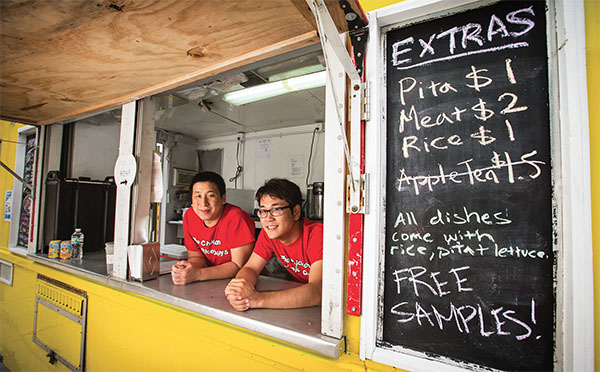
Photo: Tom Kates
Ian So (left) and Jaemin Lee (right) brought flavors from a famous food cart in New York City to the Boston area with their food trucks. Customers especially love their sauces, they say. To let people know the daily locations of their two trucks, they use their website, Twitter, and Facebook.
Initially, the group bought a cart, similar to what they had seen in New York City. But they soon discovered that the permit to operate a cart was difficult to obtain. “For carts, you can only sell on private property, so you’ve got to find somebody willing to let you sell on their property,” says So, “and most of the good spots are taken. It’s a very old industry.” Boston, however, had started a new food truck program in 2011, and with the city interested in growing the program, getting a permit was relatively easy.
Acquiring a food truck proved more interesting. After deciding to go with a used truck, So searched the Web and discovered one on eBay in Miami. The catch: They had to buy it that weekend. They called the owner, asked him questions, and talked to his mechanic. “His mechanic said everything checked out,” says So, “and we just had to go on our gut that nobody was trying to cheat us.”
So and Lau purchased two one-way tickets and arrived about noon on Saturday. They checked out the truck, which seemed fine, and headed for the bank. “We took out $19,000 and paid him in cash. That was really scary,” says So. “Driving it home was crazy. Kevin drove it first, and he was driving really slow. I was leading with the rental car, and I was like why is he all the way back there? We were driving in the wrong gear for about 20 minutes.” They drove home in 25 hours, taking turns sleeping on the floor of the truck.
With their truck in place, the group now had to find a place to prepare their food. City regulations don’t allow for preparing food at home, so a search for commercial kitchen space commenced. “That was a whole can of worms,” says So. “In the beginning, it was one of our biggest challenges.” To find a spot, they would search on Google, call people, ask for referrals, network, and then show up and try to get the space. “A lot of these kitchens, if something goes wrong, they’re liable, so their business will be impacted, too,” says So. “Some people are charging high fees. Some people won’t let you in at certain times. Our kitchen now—we share our kitchen with seven other trucks—is the most stable location we’ve been in, but we’ve had to switch kitchens about four times.”
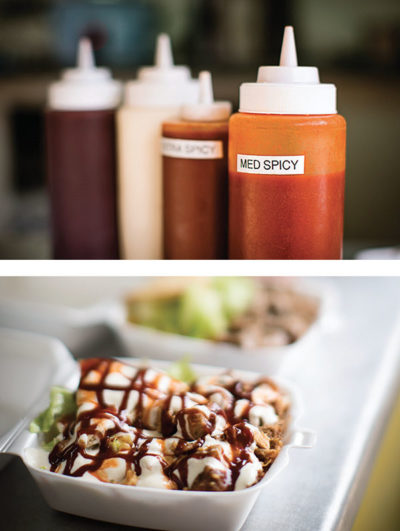
Photo: Tom Kates
Despite the hurdles, The Chicken & Rice Guys launched in April 2012, originally just on the weekends but quickly switching to full time, six days a week. “There was no way we could break even if we were just doing weekends,” says Lee. At this point, So and Lau quit their regular jobs to work exclusively on the business. Lee still has his job as an information systems analyst, but he works weekends, doing the shopping and helping prepare and cook food (he usually makes the sauces), and he helps out during the week when needed.
The group also launched another truck in the winter of this year. Winters, as one might imagine, are tough. After one storm, So had to shovel out a space before the truck could set up for lunch. “We do OK,” he says, “but it’s about half the business.” A bad weather day, regardless of the season, affects business, but their catering business is beginning to pick up, says So, which helps. Future plans include a potential brick-and-mortar restaurant, consulting, even franchising. “I think the food truck industry is plateauing, so to really take this business further, we can’t just be a food truck,” he says.
As surprising as their leap into the food truck world may have been, So and Lee enjoy running their own business. “It’s so fun to see the business grow,” says So. “I love record sales, like how much we can sell in one day. It’s exciting.” And even though Lee doesn’t put in many hours on the truck these days, he likes working with friends and meeting people. “When people like what we do or thank us or recognize our efforts,” says Lee, “it’s worth the hard work.”
Learning on the job
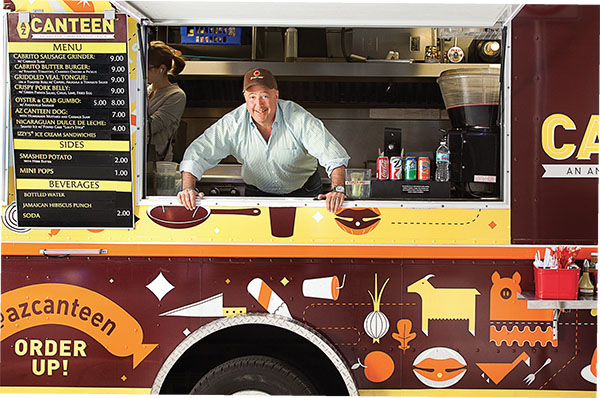
Photo: Steve Henke
An experienced chef, Andrew Zimmern created the recipes for the adventurous dishes—including goat burgers and sausages—his truck serves.
Most weekdays, the AZ Canteen truck starts cruising the streets of downtown Minneapolis around 9 a.m. The city has designated a three-block area for food trucks to set up, and those blocks are jammed with back-to-back trucks offering all kinds of fare. No one, however, can park even a minute before 9. “We parked at 8:58 this morning and were told to move,” says Mateo Mackbee, truck manager and chef for AZ Canteen.
The truck typically doesn’t start serving until around 11 a.m., but the number of people who come make the two-hour wait worthwhile. During lunchtime, the broad city sidewalk becomes packed with people wanting to eat AZ Canteen’s unusual offerings: goat burgers and sausages; grilled veal tongue; andouille, oyster, and crab gumbo, to name a few. Zimmern has brought some of the flavors he has discovered while traveling the world to his hometown.
He chose to start with a food truck versus a restaurant because of costs. “It’s cheaper, more fun, and the most important reason was the flexibility,” he says. Making changes, whether to the menu or location, is easy. Because the food truck industry is strong in Minneapolis, Zimmern checked out what other trucks were offering to see what niche he could fill. But he also didn’t let what he discovered affect his decisions too much. “You have to do your due diligence and understand the marketplace,” he says. “But then there’s the art part of it, which is what do you want to make as a chef and an owner. The mix of art and commerce, I think, is always the toughest thing in the food business to figure out.”
Zimmern also sees his truck as an extension of his brand. People watch him on television, read his articles in publications, go to his websites, listen to his podcasts. “But they couldn’t eat my food,” he says. “I had some friends saying let’s do this, so we signed a partnership agreement and off we went. That was really fast and easy. The tough part now is drilling it down and making it work as a business. That’s ongoing.”
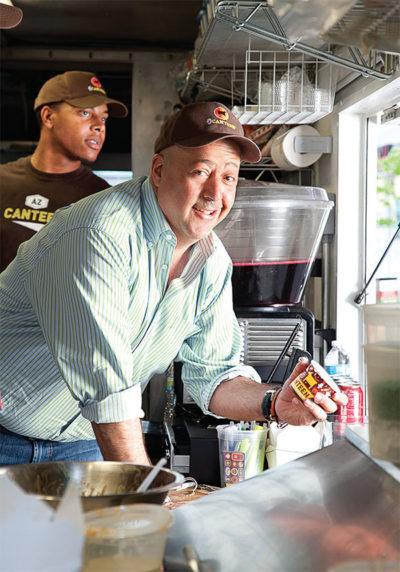
Photo: Steve Henke
Andrew Zimmern
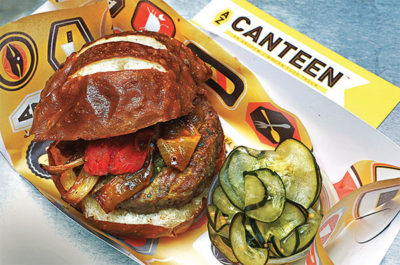
Photo: Madeleine Hill
Years of experience in the food industry didn’t prevent Zimmern from making mistakes. The truck got off to a great start, he says, capturing a strong following for the four to five weeks it operated during its inaugural summer and then acquiring kudos and national buzz at a food festival in New York City. To escape the cold Minnesota winter, the truck then went to Miami. “Huge mistake,” he says.
Turns out the food truck culture in Miami is mainly weekend rallies. “We thought, ‘We’ll drive around. We’ll find a place.’ But you find a place that works legally, and then no one stops by because it’s not in their culture to grab something off a truck,” says Zimmern. “We ended up hemorrhaging money, which would have buried a lot of different companies. We couldn’t get the truck back up here fast enough.”
So one of Zimmern’s big decisions for next winter will be what to do with the truck. For now, however, he’s focusing on the current season. He has opened a brick-and-mortar version of AZ Canteen at Target Field, home to the Minnesota Twins baseball team, and plans to expand to more ballparks and sports stadiums. A second truck is possible, too, depending on how the catering side of the business progresses and whether Minneapolis and St. Paul expand the number of places that food trucks are allowed to go. Right now the rules are too limiting, says Zimmern, packing the trucks together in the downtown area and not allowing for uptown parking near the lake and nighttime foot traffic.
Like the question of where to go when the weather turns cold, Zimmern is confident his team will figure it out. “I mean, that’s the thrill of it,” he says. “It’s like doing a crossword puzzle. At a certain point you know you can fill in those last 30 squares. We’re almost there.”
From Beantown to Portland
One day Jack Barber ’15 was chatting with his parents in a coffee shop in Boston. They were talking about the city, and Barber told them about its popular food truck scene. He wondered why Portland, Maine, the city near his hometown of Cape Elizabeth, didn’t have such offerings, to which his father answered, “I don’t know.” Barber replied, “Let’s open up a food truck.” He texted that message to longtime friend Ben Berman, who attends Tufts University, located right outside of Boston. Berman loved the idea. The two wrote a business proposal for a food truck offering gourmet burgers, and with backing from friends and family, decided to launch their business in the summer of 2012 after school released (they were still first-years at the time).
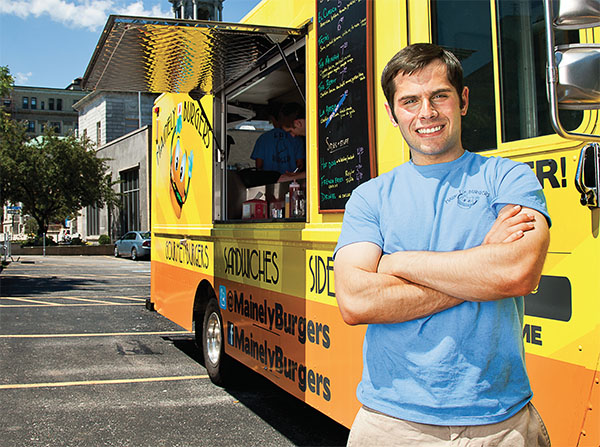
Photo: Patrick Piasecki
Family cookouts inspired the menu for Mainely Burgers, the original business of Jack Barber.
One big problem, though. Portland didn’t allow food trucks. Not to be dissuaded, the friends began searching for a place to park. A family friend suggested Scarborough Beach, a scenic state park not far from downtown Portland. “It had a concession stand, but we thought it could be improved,” says Barber. “We wrote them a proposal saying we’re going to bring in gourmet burgers, good hot dogs—everything’s fresh. They were all for it.”
With a place to operate, Mainely Burgers was in business. Now Barber and Berman had to pull it all together. They ordered a custom-built trailer from Concession Nation in Fort Lauderdale, Fla., because it was roughly half the price of a truck. To develop a menu, the two texted each other burger ideas. Their popular Mainah, which includes cheddar, bacon, sauteed onions, sliced green apples, and maple mayo, came from these texts. Obtaining permits, finding local distributors and suppliers, hiring help, and learning how to drive and park a trailer were on their to-do lists as well.
Come June, though, they were ready to go. That summer they parked the trailer at Barber’s house during off-hours. “My parents were a little upset when they heard the bread guy coming in at 6 in the morning,” says Barber. Deliveries aside, a typical day began around 7:30 a.m. They would drive the trailer to the beach, park and unhitch, hook up to water and electricity, and begin prep. Service started around 10 and would end around 5, followed by cleanup and, sometimes, a catering gig, which helped offset costs when the weather turned bad. Some evenings they squeezed in paperwork. They did this seven days a week.
At first, figuring out how much food to order for inventory proved challenging. “We ran out a couple of times,” says Barber. “Then by July and August, we knew through checking receipts and knowing the weather how much we were going to need for each day. At the end of the summer, we barely had any inventory left.”
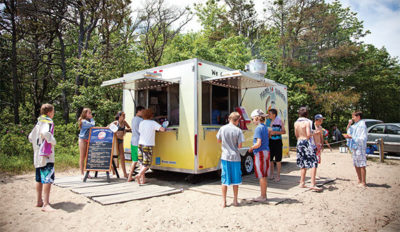
Photo: Patrick Piasecki
Mainely Burgers started with a trailer at Scarborough Beach.
Business that summer was “awesome,” says Barber. But the two still wanted a food truck. “Our goal was to be in Portland from the start,” he says. So while operating their summer business, the two joined a food truck initiative to convince the city to allow the vehicles. “There were a lot of restaurants coming to the town hall saying this is going to take away business,” says Barber. “What we had to say to them was it’s a different market. If someone really wants to take the time to enjoy a great lunch or dinner, they’re going to do that. If someone wants a quick bite but wants gourmet, they’re going to come to us.”
The food truck laws passed. So this summer, Barber and Berman expanded. They bought a food truck for lunch service as well as catering and events. They renewed with Scarborough Beach for the summer and will keep the trailer parked there for the season. And, most recently, they bought a used ice cream truck, refurbished it, and opened in July as Mainely Treats, offering handmade ice cream sandwiches, root beer floats, and sundaes.
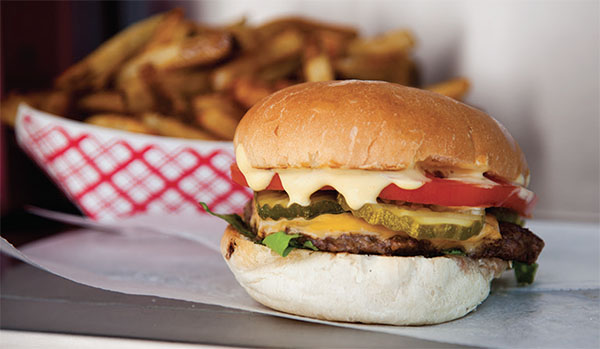
Photo: Patrick Piasecki
Not that Mainely Burgers didn’t encounter any snags. Even though Portland now allows food trucks, the spots designated to them don’t have enough foot traffic, says Barber, so they aren’t financially feasible. Instead, he worked a deal with a private lot, which a provision in the laws sanctions as long as the truck is at least 65 feet away from any restaurant. The spot, near the courthouse in downtown Portland, draws decent traffic, but still doesn’t command the crowds the two would like. As such, Barber and Berman decided to turn the commercial space they rent in the outskirts of Portland—where they keep an office, park the trucks at night, store supplies, and receive deliveries—into another service location. They’ve set up picnic tables for people who would prefer to sit and eat rather than take their lunch to go, and they’re thinking about staying open for dinner as well. “We’ll still occasionally go to the other location, but we’re hoping to make this a destination,” says Barber.
Next up for the pair is extending the season for their operation to include spring and fall, not a huge deal, except both Barber and Berman will be in school. But Barber says they found people who they can trust to run the trucks, and he and Berman will still be involved, albeit remotely. Business has been strong, so it’s worth the potential risk. “We’re excited for what is to come,” he says.
Extending their brand
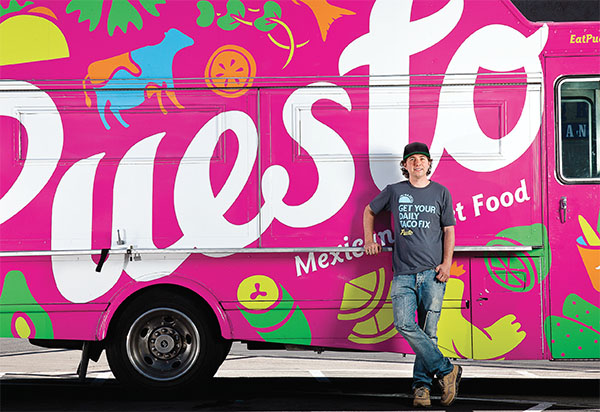
Photo: Chris Giles
While working on a project for a class his senior year at Babson, Eric Adler came up with the idea for a Mexican restaurant that offers high-quality, casual food. The idea stuck with him, and years later he opened his restaurant and food truck business.
Eric Adler ’06 originally wanted to launch his food truck while developing and building the restaurant he co-owns, Puesto Mexican Street Food in La Jolla, Calif. But he and his partners (brother Alan, cousin Isi Lombrozo, and chef Luisteen Gonzalez) ran into problems finding commercial space to prepare their food, so they decided to wait until the brick-and-mortar eatery opened in early 2012, and then began looking for a food truck about 10 months later. The truck hit the road this January.
Puesto uses its food truck mainly for catering and events. Although a curbside food truck business exists in San Diego, many trucks focus on private events, says Adler. “If we were to just show up somewhere, we wouldn’t do very well.” Puesto has been invited to sell at San Diego Padres baseball games (the president of the Padres is a fan of the restaurant, says Adler). Craft breweries are popular in San Diego County as well, he adds, and often invite food trucks like Puesto’s to sell food in their parking lots for the day.
After checking out food trucks in the popular Los Angeles scene, Adler says they bought their truck from a man in San Diego who was giving up on the business. “We found it searching on Google,” he says, “and then refurbished it.” Adler called on a design firm he had worked with previously in Washington, D.C., to create their logo and the look for the truck. Doing a completely custom truck would have taken too long, he says. “In Los Angeles, I saw this one truck that was more intense and larger than some restaurants. One guy told me there’s over a year waiting list to get one of those.”
Puesto, however, doesn’t need anything that decked out. They do all their prep and cooking at the restaurant. Making everything from scratch, from the salsa and guacamole to fresh tortillas, is easier with their own space. The truck offers a scaled-back version of the restaurant’s menu: three or four types of tacos; a Mexican fruit and veggie cup seasoned with chili, lime, and sea salt; and drinks. “We try to keep it simple, because even though we’re cooking in the restaurant, we’re still preparing everything on the trucks,” says Adler, “and we don’t want service to be slow.”
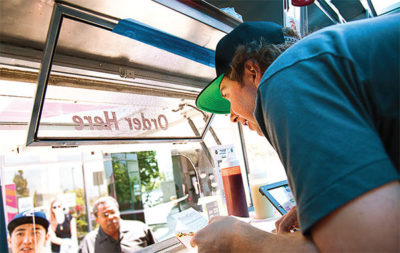
Photo: Chris Giles
Eric Adler ’06
In sunny San Diego, weather isn’t much of a problem. When it does rain, however, no one wants to drive the truck, says Adler. “Driving these things is really tough. They’re like UPS trucks. It’s a big box. When it rains, our employees who drive it get freaked out,” he says. “We have vans, too, and those things feel like Ferraris compared to the truck.”
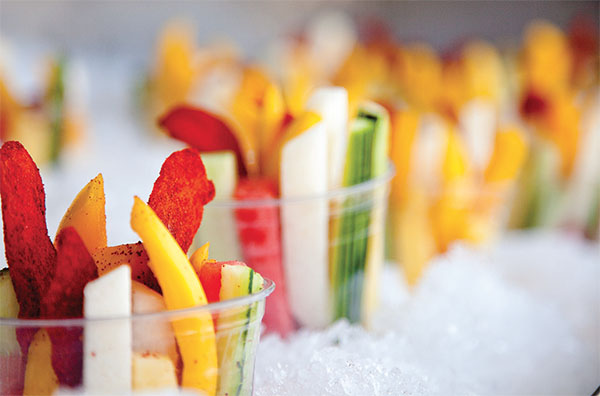
Photo: Chris Giles
All dishes are made from scratch, such as the popular Mexican Street Cup.
Besides increasing revenue, Puesto’s truck has been great for its brand and gives the business flexibility, says Adler. “People want to hire the truck,” he says. “When you’re out there at festivals and events, it’s really cool. We like being able to take our tacos to people and not just be in one market.”
The food business is tough, says Adler, but Puesto has been doing well and is building another restaurant in downtown San Diego. “There are a lot of businesses where you don’t know much and can go in and scale up your experience as you go. But in the food business, as soon as you open the door, you’re bombarded,” he says. “Customers are spending their money and eating. You learn immediately what they like and don’t like. It changes and evolves fast. There’s no time for mistakes. But it’s fun, too, working with a lot of different people. It’s really a great business.”
